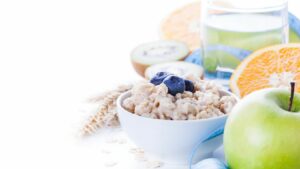Youth Sports Nutrition
- Proper Nutrition is Essential: Balanced meals rich in carbohydrates, proteins, and fats are crucial for young athletes to boost energy, performance, and recovery.
- Hydration Matters: Staying well-hydrated prevents fatigue and heat-related illnesses, significantly impacting athletic performance.

- Nutritional Challenges: Young athletes often face issues such as inadequate caloric intake, poor food choices, and hydration neglect, which can hinder their growth and performance.
- Key Nutritional Components: Emphasizing macronutrients (carbs, proteins, fats) and micronutrients (vitamins and minerals) supports overall health and athletic effectiveness.
- Meal Timing is Key: Pre-game and post-game meals should focus on easily digestible carbohydrates and lean proteins to enhance energy levels and recovery.
- Education and Support: Parents and coaches play a vital role in educating young athletes about healthy eating habits and hydration strategies for optimal performance.
In today’s fast-paced world, youth sports have become a vital part of many children’s lives. As they engage in various athletic activities, proper nutrition plays a crucial role in their performance and overall well-being. Understanding the specific dietary needs of young athletes can set them up for success on and off the field.
Nutrition isn’t just about fueling the body; it’s about enhancing energy levels, improving recovery, and supporting growth. Parents and coaches alike need to recognize the importance of balanced meals and hydration tailored for active youth. By focusing on the right nutrients, they can help young athletes reach their full potential while fostering healthy habits that last a lifetime.
Understanding Youth Sports Nutrition
Proper nutrition is essential for young athletes, as it directly influences their performance, recovery, and overall well-being. Parents and coaches play a critical role in ensuring that young athletes receive the nutrients necessary to excel in their sport.
Importance of Proper Nutrition in Youth Sports
Proper nutrition supports energy needs, enhances athletic performance, and aids recovery after training or competition. Balanced meals rich in carbohydrates, proteins, and fats supply the body with the necessary fuel. For example, carbohydrates power endurance activities like soccer, while proteins help repair muscles after strength training. Adequate hydration also plays a pivotal role in maintaining focus and preventing fatigue. Research indicates that even mild dehydration can impair performance, making it crucial for young athletes to stay well-hydrated.
Common Nutritional Challenges for Young Athletes
Young athletes often encounter several nutritional challenges that can affect their performance and health.
- Inadequate Caloric Intake: Many active youths fail to consume enough calories to match their energy expenditure, resulting in fatigue and decreased performance.
- Poor Food Choices: With the abundance of fast food and snacks, young athletes may be tempted to choose less nutritious options that lack essential vitamins and minerals.
- Hydration Neglect: Young athletes may overlook hydration needs, particularly during practice or competition, leading to decreased performance and increased risk of heat-related illnesses.
- Dietary Restrictions: Some teens follow restrictive diets or have food allergies, complicating their ability to obtain balanced nutrition.
Addressing these challenges requires education and support from parents and coaches, promoting healthy eating habits for optimal performance in youth sports.
Key Nutritional Components
Proper nutrition for young athletes centers on key components that support their unique needs. Focusing on macronutrients and micronutrients provides the foundation for optimal performance and health.
Macronutrients: Carbohydrates, Proteins, and Fats
- Carbohydrates: Carbs act as the primary energy source. Complex carbohydrates, like whole grains and fruits, deliver sustained energy, while simple carbohydrates, such as honey and fruit juices, offer quick fuel during intense activities. Youth athletes should aim for 45-65% of total daily calories from carbohydrates.
- Proteins: Proteins play a crucial role in muscle repair and growth. Lean sources, like chicken, fish, beans, and dairy, provide essential amino acids. Recommended protein intake ranges from 1.2 to 2.0 grams per kilogram of body weight, depending on the intensity of the sport.
- Fats: Fats supply energy and support hormone production. Healthy fats from sources like avocados, nuts, seeds, and olive oil are necessary. Young athletes should consume 20-35% of total daily calories from fats, focusing on unsaturated fats for better health.
- Vitamins: Vitamins aid in energy production, immune function, and muscle contraction. Key vitamins include Vitamin D for bone health, Vitamin C for immune support, and B vitamins for energy metabolism. A varied diet rich in fruits, vegetables, whole grains, and lean proteins ensures adequate vitamin intake.
- Minerals: Minerals like calcium, iron, and zinc are vital for various bodily functions. Calcium supports bone density, iron promotes oxygen transport in the blood, and zinc contributes to growth and recovery. Young athletes should consume dairy products, leafy greens, lean meats, and legumes to meet their mineral requirements.
Prioritizing these nutritional components helps young athletes enhance performance, support recovery, and maintain overall health.
Hydration and Its Role in Youth Sports
Hydration plays a crucial role in the performance and well-being of young athletes. Proper fluid intake supports physical activity and recovery, ensuring optimal function during sports.
Signs of Dehydration in Young Athletes
Young athletes may exhibit several indicators of dehydration, including:
- Thirst: A primary signal indicating the need for fluid intake.
- Dry Mouth: A common symptom when the body lacks adequate water.
- Fatigue: Significant tiredness can occur due to insufficient hydration.
- Decreased Performance: Noticeable decline in strength, speed, or endurance during activities.
- Dark Urine: Focus on urine color; darker shades may suggest dehydration.
- Headaches: Frequent headaches may indicate fluid deficiency.
Monitoring these signs helps ensure timely hydration, supporting health and performance.
Best Hydration Practices for Youth Sports
Implementing effective hydration practices is vital for young athletes. Consider these strategies:
- Drink Regularly: Encourage consistent fluid intake before, during, and after activities. Water and electrolyte beverages can replenish lost fluids.
- Pre-Hydration: Ensure athletes drink ample fluids 2-3 hours before exercise, enhancing hydration status.
- Monitor Sweat Loss: Adjust fluid intake based on the intensity of activity and environmental conditions, especially in heat.
- Encourage Water Breaks: Schedule breaks during practice or games for hydration, preventing excessive fluid loss.
- Hydration Plan: Develop individualized hydration plans tailored to specific sports, activity levels, and personal preferences.
- Educate on Fluid Needs: Teach athletes the importance of hydration and recognizing their own hydration needs.
Applying these best practices establishes a foundation for lasting hydration habits, enhancing performance and overall health in youth sports.
Meal Planning for Young Athletes
Meal planning is crucial for young athletes, providing the right nutrients at the right times can significantly enhance performance and recovery.
Pre-Game Meals: What to Eat and When
Pre-game meals should focus on providing easily digestible carbohydrates and moderate protein. Athletes should consume these meals 3-4 hours before competition for optimal energy levels.
- Carbohydrates: Opt for whole grains, fruits, and vegetables. Foods like brown rice, whole grain pasta, and bananas serve as excellent energy sources.
- Protein: Include lean proteins such as chicken, turkey, or yogurt. These aid muscle repair without overly taxing the digestive system.
- Fats: Keep fat intake low, as high-fat meals can slow digestion. Consider small amounts of healthy fats from sources like nuts or avocado.
- Hydration: Drink water or electrolyte beverages to ensure proper hydration prior to physical activity. Aim for 16-20 ounces in the hours leading up to the event.
Post-Game Recovery Nutrition
Post-game recovery focuses on replenishing energy stores and repairing muscles. Consuming the right nutrients within 30 minutes after activity significantly aids recovery.
- Carbohydrates: Include simple carbohydrates like sports drinks or fruit to quickly restore glycogen levels.
- Protein: Aim for 15-25 grams of protein from sources such as chocolate milk, protein shakes, or chicken. This supports muscle repair and growth.
- Fluids: Rehydrate with water or electrolyte solutions to replace fluids lost during play. Monitoring urine color can help ensure hydration levels remain adequate.
- Balanced Recovery Meal: Following the initial recovery phase, consume a well-balanced meal within 2 hours, including complex carbohydrates, lean protein, and healthy fats to continue supporting recovery and sustain performance in future activities.
Striving for Peak Performance
Proper nutrition and hydration are crucial for young athletes striving for peak performance. By understanding the unique dietary needs of active children, parents and coaches can make informed choices that support energy levels and recovery. Emphasizing a balanced intake of macronutrients and micronutrients lays the groundwork for long-term health and athletic success.
Establishing healthy eating and hydration habits not only enhances performance but also fosters a positive relationship with food and wellness. As young athletes navigate their sports journeys, prioritizing nutrition will empower them to reach their full potential and enjoy the many benefits of an active lifestyle.

